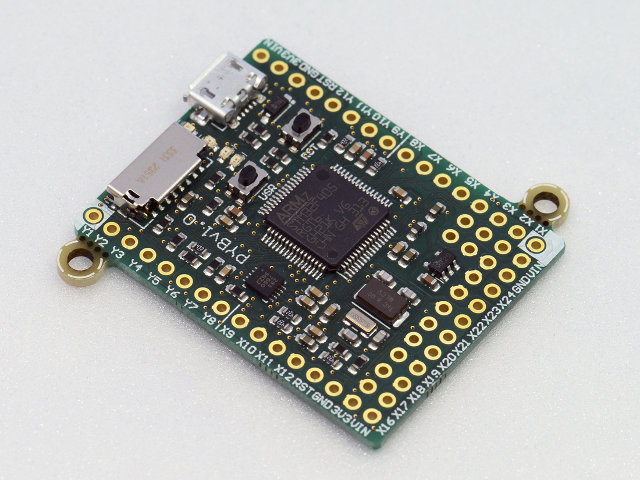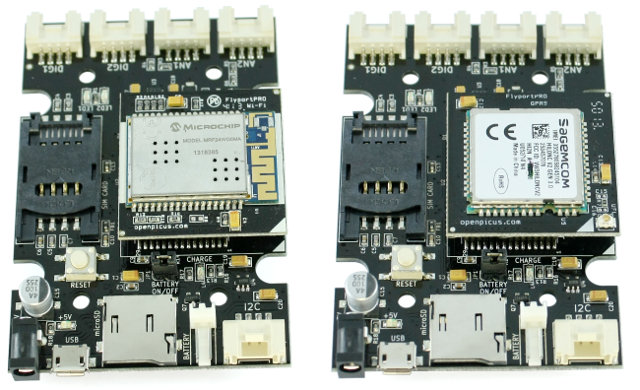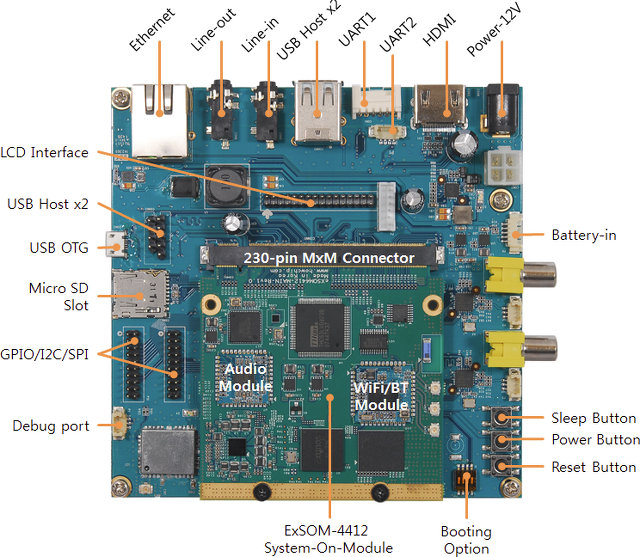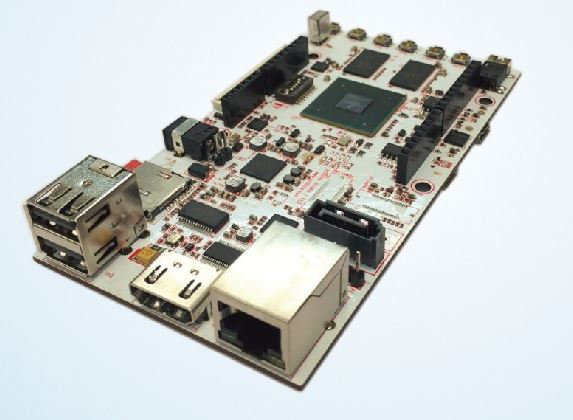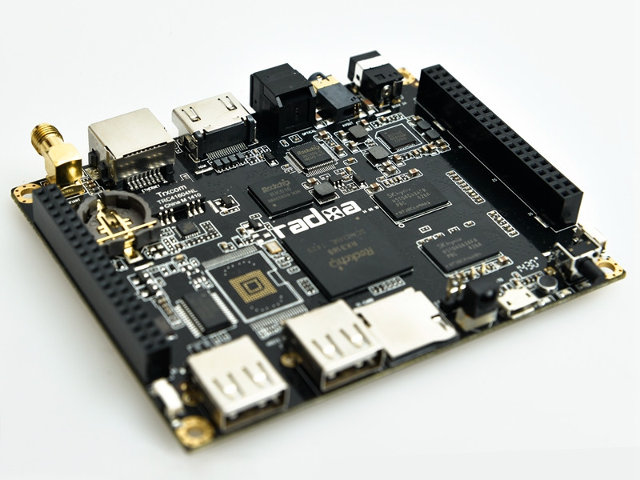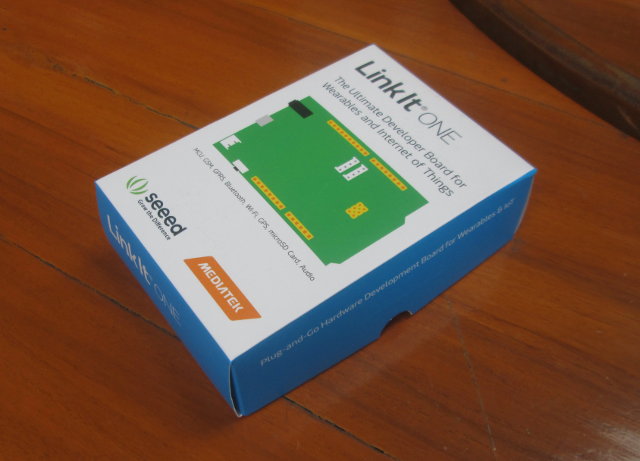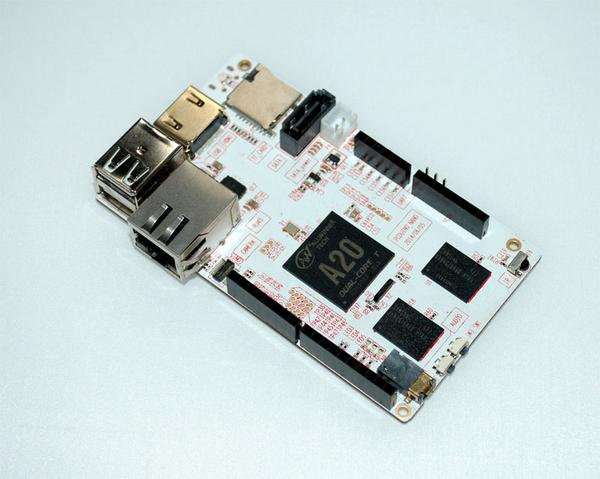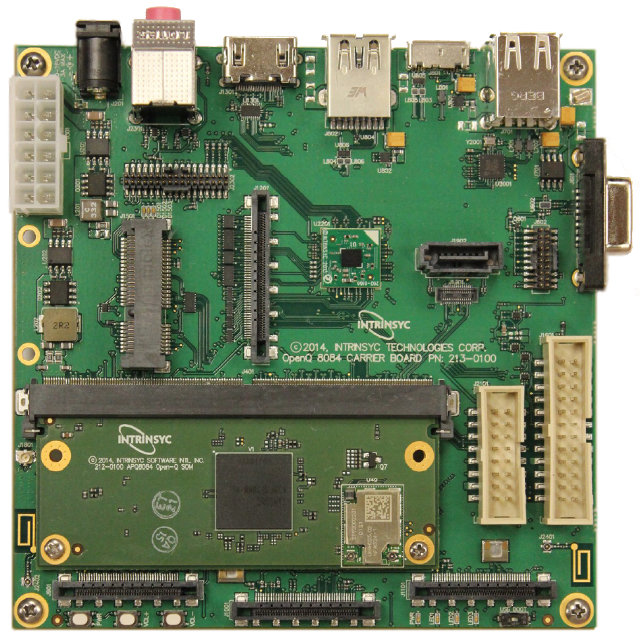MicroPython is both a lightweight implementation of Python 3.4 programming language, and a board, aka pyBoard, based on STMicro STM32F4 ARM Cortex M4 micro-controller running Micro Python. The project had a successful Kickstarter campaign in 2013, and they’ve completed shipment of the perks to their backers last June. The company has now launched its own store, so let’s see the progress of the project. The board has been re-designed since Kickstarter campaign, but the specifications remains the similar, but with some extra I/Os exposed: MCU – STMicro STM32F405RG micro-controller @ 168 MHz with 1MB flash, 192KB RAM, and an FPU. External Storage – Micro SD card slot, supporting standard and high capacity SD cards Expansion Headers: 24x GPIO on left and right edges and 5x GPIO on bottom row, plus LED and switch GPIO available on bottom row 3x 12-bit analog to digital converters, available on 16 pins, 4 with […]
openPicus Introduces Wi-Fi and GPRS IoT Kits Powered by Microchip PIC24 MCU
openPicus has launched two new development kits for the Internet of Things with either Wi-Fi or GPRS connectivity, based on their FlyportPRO modules featuring a 16-bit Microchip PIC24 MCU, and sharing the same baseboard. These kits can be used as a Web server with firmware update over the air (FOTA) (Wi-Fi version only) among other things, and support TCP, UDP, FTP, & HTTP protocols, as well as MQTT (Message Queue Telemetry Transport), a light weight messaging protocol running on top of the TCP/IP protocol, used when a small code footprint is required and/or network bandwidth is limited. openPicus FlyportPRO Wi-Fi and GPRS modules share mostly the same specifications: MCU – Microchip PIC24FJ256GB206 16-bit MCU @ 32 MHz with 256KB Flash, 96KB RAM External Storage – 16Mbit Flash memory (for FOTA), 64Kbit EEPROM Connectivity GPRS Module – SAGEM HILONC GPRS Transceiver (quad band: 850, 900, 1800, 1900 MHz) with uFL connector for external […]
Howchip Introduces ExSOM-4412 Module and Development Kit Powered by Samsung Exynos 4412 Quad Core SoC
Howchip, the company that normally distribute Insignal Origen and Arndale boards, has just introduced ExSOM-4412 system-on-module, and a corresponding development kit called ExSOM-4412-DVK. ExSOM-4412 module specifications: SoC – Samsung Exynos 4412 quad core Cortex A9 CPU with Mali-400MP4 GPU System Memory – N/A (TBC) Storage – Up to 8GB eMMC + SD/SDIO interface Connectivity – 10/100Mbps Ethernet, optional Wi-Fi and Bluetooth module Video Output – HDMI(1080p) for TV, 2-ch LVDS for TFT LCD Camera – 2x parallel camera interfaces Audio – Line in/out and Headphone out. USB – 4x USB 2.0 Host ch and OTG Configurable GPIOs, Analog inputs, PWMs and Serial interfaces such as I2Cs, SPIs, and UARTs SoM Connector – 213-pin MXM connector Dimensions – 70mm x 70mm The dimensions and connector used points to the module following Qseven standard, but the company does not mention anything about Qseven, so the pin assignment may be different. Software support […]
pcDuino Acadia 1 is a Freescale i.MX6 Quad Development Board with Arduino Headers
Linksprite has been pretty busy recently. After announcing the $39 pcDuino3 Nano, they’ve now unveiled a new board named pcDuino Acadia 1 powered by Freescale i.MX6 Quad processor with 1GB RAM, 8GB eMMC, a few common ports, and Arduino headers in order to connect Arduino shields to their Linux/Android board. pcDuino Acadia 1 (preliminary) specifications: SoC – Freescale i.MX6 Quad with four ARM Cortex A9 cores up to 1.2GHz, and Vivante GC2000 GPU with support for OpenGL/ES 2. x, OpenCL EP support, and OpenVG 1.1. System Memory – 1GB DRAM Storage – 8GB eMMC, 2x micro SD card slots (up to 128GB), and SATA Video Output – HDMI 1.4 with HDCP support, LVDS Audio Output – 3.5mm analog audio interface Camera – 1x MIPI, 1x CSI Connectivity – 10/100/1000Mbps Ethernet (limited to 470Mbps) USB – 2x USB 2.0 host ports, 1x micro USB OTG Expansion Headers – Arduino UNO compatible […]
The New Radxa Rock Lite Rockchip RK3188 Development Board Sells for $59
You may have heard about Radxa Rock Lite development board before, so let’s clear up the different versions of the Radxa Rock first. There’s a total of four Radxa Rock models: Radxa Rock (2013) – The original version with 2GB RAM, 8GB NAND Flash, and Wi-Fi/Bluetooth Radxa Rock Lite (2013) – 1GB RAM, 4GB NAND Flash, and Wi-Fi only Radxa Rock Pro (2014) – An evolution of the Radxa Rock still with 2GB RAM, 8GB NAND flash, Wi-Fi/Bluetooth but adding LVDS and camera interfaces. Radxa Rock Lite (2014) – 1GB RAM, no NAND flash, and Wi-Fi only The fist two versions appear to have been phased out, as they are not listed for sale on Radxa Rock website, and today, I’ll write about Radxa Rock Lite (2014). Radxa Rock Lite (2014) specifications: SoC – Rockchip RK3188 ARM Cortex-A9 quad core @ 1.6Ghz + Mali-400 MP4 GPU System Memory – 1GB […]
Getting Started with LinkIt ONE Development Kit for Wearables & IoT
After going through WRTnode Quick Start Guide, it’s now time to play with LinkIt ONE, the IoT development board from Mediatek designed by Seeed Studio. LinkIt ONE is the first Hardware Development Kit (HDK) for Mediatek LinkIt, so there may be a LinkIt TWO, and/or other hardware platforms in the future. LinkIt ONE specifications Let’s quickly go through the specifications first: Processor – Mediatek MT2502A (Aster) ARM7 EJ-STM processor @ 260 MHz System Memory – 4 MB Storage – 16MB Flash for firmware + micro SD slot shared with SIM slot for up to 32GB additional storage Connectivity: Wi-Fi – 802.11 b/g/n (MT5931) with external antenna Bluetooth – BR/EDR/BLE(Dual Mode) GPS – Mediatek MT3332 with external antenna GSM/GPRS – 850/900/1800/1900 MHz band, Class 12 GPS with external antenna Audio – 3.5mm headphone jack (including mic support) – Support for MP3, AAC, and AMR codecs. Serial – Software Serial (Serial), and […]
$39 PcDuino3 Nano ARM Linux Development Board Features HDMI, SATA, Gigabit Ethernet, Arduino Headers…
Linksprite recently announced PcDuino3 Nano development board powered by AllWinner A20 dual core processor. PcDuino3 Nano is, as you can expect, a smaller and cheaper version the company’s PcDuino3 board without Wi-Fi module, LVDS header, and I2S interface. The board does not appear to support Li-Po batteries either, but it adds one extra USB host port compared to its big brother. pcDuino3 Nano specifications: SoC – AllWinner A20 dual core ARM Cortex A7 @ 1.0 GHz with Mali 400MP2 GPU System Memory – 1GB DRAM Storage – 4GB NAND Flash, SATA connector, and microSD card slot (up to 32GB) Video Output – HDMI 1.4 with HDCP support Audio Out – 3.5mm analog audio interface Connectivity – Gigabit Ethernet USB – 2x USB host, 1x USB OTG Expansion Headers – Arduino UNO extension interface with 14xGPIO, 2xPWM, 6xADC, 1xUART, 1xSPI, 1xI2C. Camera – MIPI camera support Misc – IR receiver Power […]
Intrinsyc OPEN-Q 8084 Development Kit Powered by Qualcomm Snapdragon 805 Processor
Inforce Computing IFC6540 was the first low cost development board powered by Qualcomm Snapdragon 805 processor I discovered a few months ago, but is currently “for pre-approved customers only and have not yet been released to public”. Intrinsyc has now launched their own Snapdragon 805 development kit called OPEN-Q 8084 based on a mini-ITX carrier board, and a SoM with 3GB RAM, and 16GB eMMC. The board target applications include ruggedized tablets, digital signage, government/public safety, medical, robotics, wearable displays, video streaming/conferencing, gaming systems, and in-flight entertainment. Specifications of APQ8084 Open-Q System-on-Module: SoC – Qualcomm Snapdragon 805 (APQ8084) quad core Krait 450 @ 2.5GHz, with Adreno 420 GPU @ 500MHz, Hexagon QDSP6 V5A (600MHz), and two ISPs for up to 55-megapixel stereoscopic 3D System Memory – 3GB PoP LPDDR3 RAM Storage – 16GB eMMC 5.0 flash, expandable to 64GB, micro SD signals, and SATA signals (via MXM connector) Connectivity – […]


